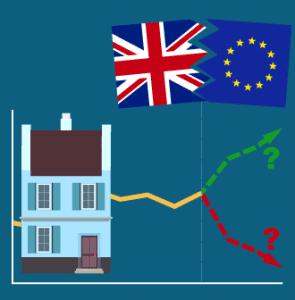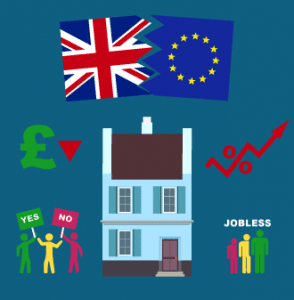House Prices After Brexit
 Who would have thought that many of us would wishing for Brexit to be topic of the day again?!
Who would have thought that many of us would wishing for Brexit to be topic of the day again?!
The massive shock of coronavirus on all our lives has completely flipped the previous content of this blog post on its head.
As discussed in our extensive guide to selling your house during the coronacrisis, we’re now faced with a bigger threat to the health of both the economy and property market since the 2007/08 recession.
Where Does Coronavirus Leave the Brexit Situation?
The government’s efforts largely remain on controlling the spread of COVID-19. As 2021 progresses, we should hopefully see the vaccine roll out to most of the population and a return to some semblance of normality.
With the coronavirus arguably overshadowing the negotiated Brexit deal agreed at the end of 2020, many are concerned as to how things will play out in practical terms.
Nonetheless, at least for the course of 2021, it is our belief that Brexit will continue to take a backseat which could have majorly negative effects in the medium to long term.
What Does This Mean for House Prices?
The truth is that nobody really knows…
However, as estate agents ourselves, we saw that most buyers proceeded with the sales agreed before the multiple COVID-19 lockdowns and there was very little panic selling.
Indeed, major house prices indices like the Halifax and Nationwide reported growth in house prices.
The general consensus remains that both Brexit and the Coronavirus are unlikely to trigger a crash similar to 2007/08. The banking system, worried as it may be at the current time, is a lot stronger financially.
Of course, expecting for there not to be some kind of correction would be naive – but we would advise ignoring the ‘clickbaity’ headlines warning of a massive house price crash.
House Prices After The Brexit Referendum
The current panic regarding house prices, to a certain degree, is somewhat similar to the lead up to the referendum vote.
You may remember before the referendum back in 2016, leading economists and even the Bank of England predicted that house prices would fall dramatically.
As the stock market crashed shortly after ‘leave’ won, there was talk of house prices heading on a long term trajectory downwards.
But, as shown in the graph below, all the major price indices showed a different story.
Of course, the situation is very different here. The population’s health has come under major risk and there are serious socio-economic risks at play.
However, what is certain is that the housing market is more resilient than many believe.
Post-referendum, transaction volumes dropped as people panicked.
This month, the government has dropped the Bank Base Rate to a record low of 0.01% to mitigate the economic risks of Coronavirus.
Although these are yet to be passed to borrowers, mortgage rates from banks and building societies are still competitively priced.
It’s our belief that this unprecedented price drop will fuel house price growth once the Coronavirus crisis is over.
A Longer-Term View on Housing Supply in the UK
Secondly, there is a major undersupply of good quality housing coming onto the market. This is a particularly serious issue in the south of the country.
With every year that passes where housebuilding targets are not met, average prices grow as there are not enough homes to go around.
It’s likely that property development activity, whilst higher than in 2020, will remain relatively low.
Related to this, the complex planning system and rising building costs continue to drive down the number of new properties coming to market.
Thirdly, the government’s Help to Buy scheme has enabled over 450,000 first-time buyers to get on the housing ladder.
Although this initiative has been criticised for not assisting those most in need, it has certainly supported house price inflation across the country.
Of course, as positive as this all may sound, this certainly doesn’t mean that the property market will thrive.
Brexit Property Market Risks
 The property market is often influenced by what’s happening in the wider economy.
The property market is often influenced by what’s happening in the wider economy.
This is because housing costs usually take up a lot of what we earn.
So when major disruptions like the Coronavirus happen, as the economy takes a hit, so does the property market (even though, as mentioned above, we believe this will be a short dip).
When it comes to Brexit, however, we’re looking at a different reality and the impacts make some time to filter through.
Much will also depend on the effects of the trade deal with the EU. Now that Coronavirus has come into play, there could be a complete alteration of the dynamics.
You’ll probably be aware that opinions are always wide and varied…
Some are sure that Armageddon is just around the corner, particularly now with Boris Johnson in power.
Indeed, there are many at the opposite end of the scale that believe the economy will shine brightly as a result of leaving.
The best-case Brexit scenario?
The very ‘best-case’ scenario for the housing market is that Boris Johnson’s negotiations play out reasonably smoothly in the coming years.
In other words, Brexit happens without any major hitches. Key components of the economy, like trade and jobs, are not affected too badly in the medium to long term.
The country also eventually benefits from the extra money not being contributed to the EU budget and stronger ties with countries outside the union.
In turn, the house prices will grow steadily and Boris Johnson’s plan of becoming the ‘Brexit hero’ come to fruition.
So what’s the worst-case Brexit scenario?
At the end of 2020, with Boris’ cabinet’s strong majority and much of the focus on stemming the effects of the pandemic, the Brexit deal went ahead without the scrutiny originally expected.
Although some sections of the media have downplayed the negative effects, to expect a smooth break from a key (and closest) trading partner is unrealistic.
Importers across various sectors as well as the automotive, airline, pharmaceutical and financial services sectors have already had their revenues badly hit.
For those that have looked into the detail agreed, we’ve effectively entered
However, there’s still a risk that the country could end up in ‘no deal’ or ‘hard’ Brexit scenario following the trade negotiations this year.
The result, if so, could be that the value of the pound could drop – the usual consequence of which is inflation (i.e. prices go up).
People have less disposable income and ‘batten down the hatches’.
The Bank of England’s traditional response is to push up the Bank Base Rate (BBR).
This would then filter into the mortgage market in the form of higher rates.
In turn, there will be fewer house buyers, those on variable or tracker rates will have higher costs every month and the market slows down.
Combine this with wider unemployment plus falling incomes and things could get messy.
Or perhaps it will be somewhere in between and house prices will broadly remain flat?
It would therefore seem that, at least for the time being, there’s a reasonable degree of market confidence.
Brexit: Keep Calm and Carry On
 If you’re struggling to sell at the moment, our advice is to stay calm, ignore all media-led hysteria and pay close attention to the real facts.
If you’re struggling to sell at the moment, our advice is to stay calm, ignore all media-led hysteria and pay close attention to the real facts.
The UK housing market works in cycles and – whilst it’s never easy to predict – some form of price correction will happen (Brexit or no Brexit).
The country has experienced house price crashes in the 1980s, 90s and in the late 2000s after the credit crunch.
Even so, following what may be a lull period, the market will eventually recover.
Many homeowners across the country have also gained equity in their homes.
If you’re one of them, a potential downturn will not place you in a bad situation even if you really need to sell your property.
Where possible, despite the seemingly endless delays, you may choose to wait and see how things play out.
Remember that, if you end up selling up for lower than you originally expected, the rest of your local property market has probably dropped in value as well.
So you’ll pay a lower price for anything you buy as the whole of the market (not just your own house) is cheaper.
Think of it as a rising and falling tide on which all houses are floating together.
Selling Your House in a Brexit Era
 Even if Brexit proves to be a disaster, one thing is for sure: people will need a roof over their head. If you need to sell, you will!
Even if Brexit proves to be a disaster, one thing is for sure: people will need a roof over their head. If you need to sell, you will!
Even if things slow down, there is always a market for buying and selling homes.
Below we’ve highlighted the three main channels, namely: an estate agency sale, using an auction house and selling directly to a quick buying company like Property Solvers…
Selling on the Open Market (Estate Agency Sale)
The most common way to sell a house and secure the best price. These days, the competition for your business is hot.
You may also be getting a little confused when deciding on whether to use an offline or offline agency.
Despite the extra costs, most people prefer the ‘personal touch’, i.e. dealing with an estate agent face-to-face.
However, perhaps if you don’t mind being a little more proactive, doing everything over the internet and phone might work.
Here at Property Solvers, we offer a quick estate agency service which provides clients with the best of both worlds.
As you’re generally dealing with buyers looking at several other properties, the process can be slow (4-6 months).
Taken from our 101 tips to sell your house quickly guide, below are some pointers that can help speed things up:
- Keep an eye out on local prices to make sure yours is in line with the market (see our house valuation guide for some free tools you can use);
- Once you understand what’s going on for yourself, be wary of the classic estate agent trick of promising an unrealistically high price to get your business;
- If you see more FOR SALE than SOLD signs, it’s usually a sign of a slowdown. You may need to adjust your price accordingly;
- Check the estate agent’s marketing plan and ensure your house will get good exposure;
- Make sure you have all your paperwork and sellers pack in order (including gas / electrical servicing documentation and building regulations certificates where necessary);
- Create a nice curb appeal and make sure your property is welcoming;
- See what else is on the market and work towards making your house stand out. Remember, you don’t have to spend a fortune!
Selling at Auction
These days, auctions are not just for people looking to offload problem properties.
People approach auctions when they’re not getting what they need from an open market sale. You’ll often find all sorts of buyers bidding on homes, especially given the growth of online auction platforms.
The main benefit for you as a seller is greater certainty.
Once the hammer falls, there is a legally binding exchange of contracts. If the buyer pulls out for whatever reason, they’ll lose their deposit and incur other fees and penalties.
From start to finish, you could also be looking at up to 3 months to get your property sold.
This is because you usually need to give the auction house time to actively market your property and organise viewings / open days.
Then, after the exchange (on the day of the auction), you’ll usually have to wait another 28 days until completion.
Remember that selling fees with auction houses tend to be more expensive than estate agents. Make sure you read the small print and look out for ‘hidden extras’.
Quick Home Buying Company
Relatively new in the property industry, quick house sale companies work with homeowners in search of a more efficient service.
The main advantage of using a quick buyer is that properties are bought for cash within timeframes as short as 7 days (although the typical sales time is 28 days).
Most will also cover your legal fees.
As the sale is direct, there is also no estate agency involvement and you can often access cash in advance.
Offers are generally lower than what you would get with an estate agent and around the same as with auction houses.
Going ahead with a sale will therefore largely depend on how urgently you need to complete. Although, make sure you watch out for the quick house sale scams.
Quick buying firms also buy the properties that buyers often do not want.
They’ll happily take on properties with structural issues, serious damp, subsidence or complex legal questions.
A Property Solvers House Sale
Property Solvers has been set up since 2005 as a quick house buying company.
We have bought a range of different properties across the UK.
Our clients are safe in the knowledge that we are a trusted and accredited house buyer.
As well as developing our own Code of Practice, we adhere to The Property Ombudsman and Trading Standards guidelines.
We are also registered with the National Association of Property Buyers, Trading Standards the Data Protection Authority and the UK government´s own money laundering regulations.
We also offer an express home sale service. This is for clients that want a fast sale but do not want to accept a lower price.
Although the sale is not as secure as our quick cash sale, we work to get firm offers in place within 28 days.
Furthermore, unlike a growing number of agents, there are no tie-ins and no upfront fees. You really have nothing to lose by giving us a try!
Should you wish to discuss any aspects of the fast sale of your home, please contact us via 0800 044 3733 (freephone). Our lines are open 24 Hours, 7 days a week. Alternatively, fill your details in the contact box below or e-mail us at info@propertysolvers.co.uk.
We´re waiting to help and placing pressure on you to sell is not our style…

